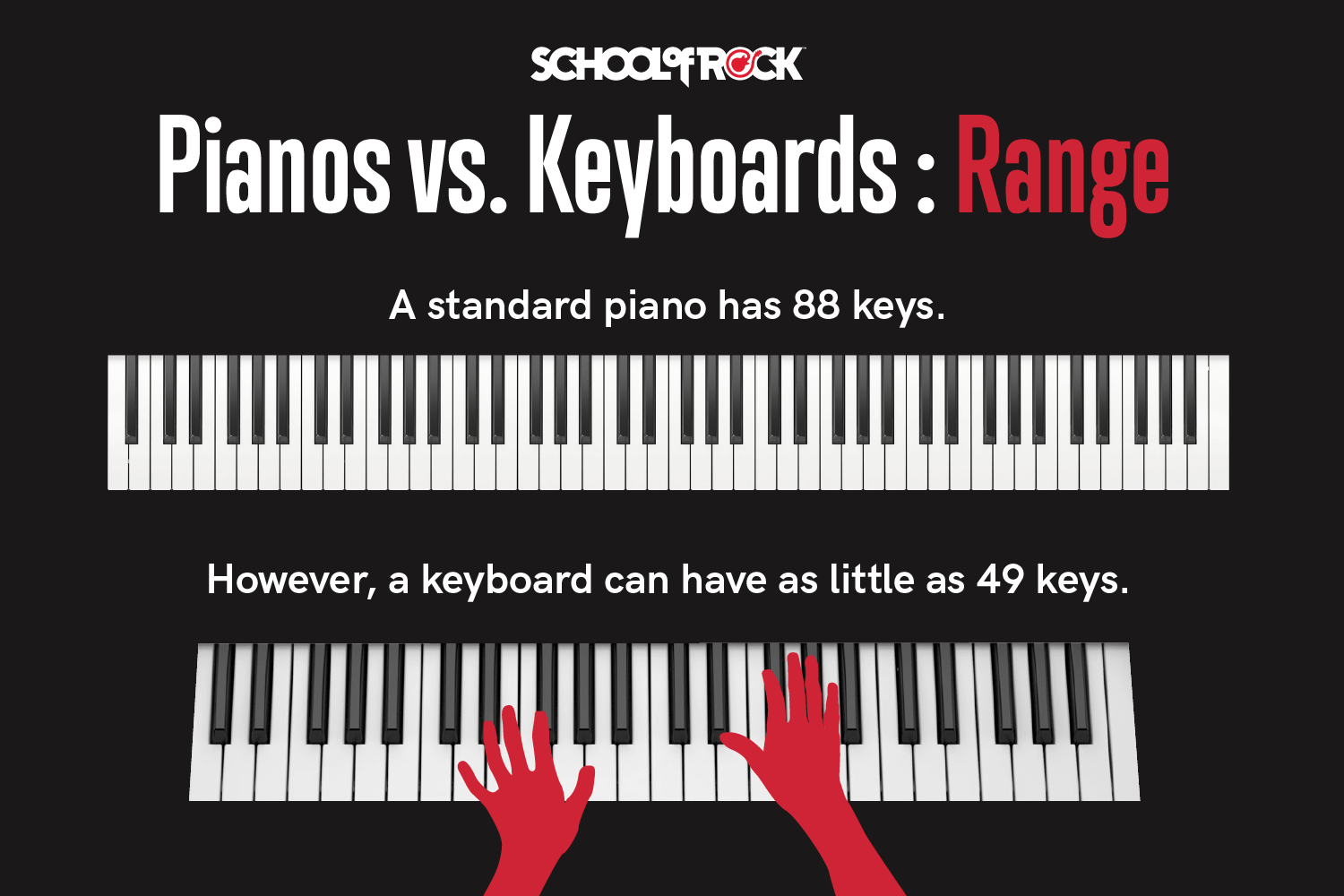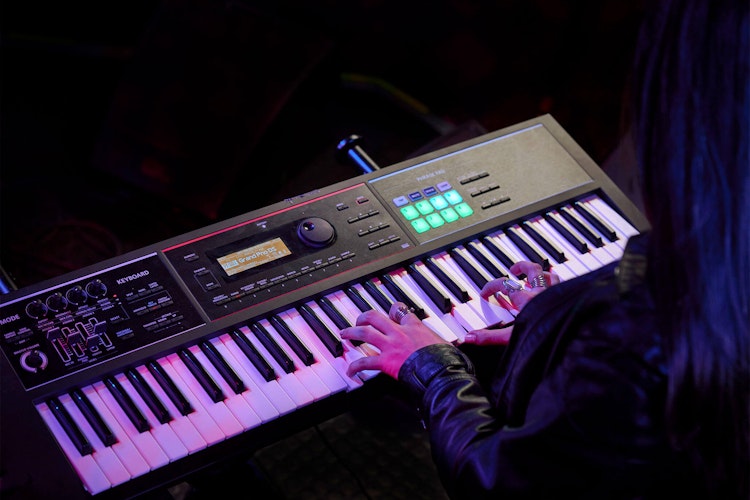A common question many students and parents ask School of Rock is “What is the difference between piano and keyboard?” and “Can you learn piano on a keyboard?” While there are differences in the sounds these instruments produce and how they make them, the answer is “yes!”—it is possible to learn to play piano on a keyboard.
At School of Rock, our keyboard instructors teach students how to learn piano on a keyboard with confidence and inspire them to get up on stage and play in a band with their peers in front of a live audience.

DECIDING BETWEEN A PIANO VS. A KEYBOARD
Since the two instruments share many similarities, the concepts you learn and practice on a piano will transfer directly to playing on a keyboard, making it a great way to learn piano. However, there are subtle differences between the two instruments that are worth noting.
- Action. The “action” of a keyboard or piano describes how well the keys respond when pushed down. As an acoustic instrument, pianos tend to have more action and have a weighted feel when playing. A keyboard with weighted keys is a good option for students who want a similar feel to the piano. The latter option is a great choice when a student wishes to learn piano on a keyboard.
- Key arrangement. The arrangement of the keys on a keyboard piano is identical to the arrangement of the keys on a classic piano, and your hand and finger movements will be identical from one instrument to the other. Pianos all use the same width keys, and many keyboard keys are identical or slightly narrower in width. This slight change in width won’t take too much getting used to if you’re going to switch back and forth from one size of keys to another.
- Range. The standard classic piano has 88 keys, as do many electric keyboards. However, some piano keyboards have less than 88 keys. The number of keys differs depending on the model you choose for your kid, but if you want to learn piano on a keyboard, you’ll need at least 72 keys to play the majority of popular piano compositions.
- Cost. In general, keyboards tend to be more affordable than pianos. The cost of a piano may be high depending on the manufacturer, the material, and the design, but you can find pianos being sold second-hand for relatively less. For piano keyboards, you can usually purchase a model for less than a hundred dollars, but some models may cost more depending on the features. For this reason, some parents may want to consider renting a piano or keyboard until their child is certain they want to learn piano on a keyboard.
- Sound. Sound options vary depending on if you choose a piano vs. a keyboard. The piano is an acoustic instrument, meaning its sound is produced and amplified physically. In comparison, keyboards are electronic instruments with a variety of volume options and often can produce sounds like piano, horns, strings, organs, synthesizers, and more. Since they’re electronic, they often require amplification to produce sound, although some models come with speakers built in. Unlike pianos, keyboards can be made loud or quiet by using their volume knob.
- Size and portability. Pianos tend to be large and are designed to stay in place most of the time. Due to their size, they often need to be moved by teams of professionals. In contrast, many keyboards are very light and portable, making them ideal for those who wish to learn piano on a keyboard. Due to their smaller size, keyboards tend to be easier to move and can be put away as needed, and are great for traveling musicians who need to bring their instruments with them wherever they perform.
- Maintenance. In general, it’s important to keep your piano or keyboard in good condition by cleaning the instrument regularly. In addition to regular maintenance, pianos also need to be kept in tune. As an acoustic instrument made of wood and metal, pianos can fall out of tune due to environmental factors like temperature, humidity, or seasonal changes. In general, it is recommended that piano owners regularly tune their pianos with the help of a professional, which can add up in cost. This is an important factor to consider when researching piano vs. keyboard benefits.
- Where to buy. Both pianos and keyboards can usually be purchased online or at your local music store. Because of their large size and weight, pianos often need to be moved by professionals for a fee. Since they’re smaller and lighter, keyboards tend to be less expensive to ship or can be carried out of the store without the need of a professional team. Depending on where they shop, parents also have the option of renting their instruments before they commit.
Play the keyboard in real performances
Our music programs are taught by practicing musicians with the experience students need to learn to play piano on the keyboard. Students can perform live shows and develop their skills in a supportive learning environment for all skill levels.
Learn to playFREQUENTLY ASKED QUESTIONS ABOUT PLAYING PIANO vs. KEYBOARD
Here are some questions many students and parents ask School of Rock when discussing the differences between playing a piano vs. a keyboard, and figuring out which instrument will best meet a student's goals.
CAN YOU LEARN PIANO ON A KEYBOARD?
Yes, learning piano on a keyboard is possible. The layout of the keys is identical on both instruments. The songs you learn to play on a piano will transfer directly to a keyboard, and vice versa, with little adjustment needed for small differences in the width of the keys or the amount of pressure needed to play them.
DO A PIANO AND A KEYBOARD SOUND THE SAME?
When comparing the differences between a piano and a keyboard, sounds can vary depending on the make and model of each instrument. Many keyboard pianos are designed to make sounds that replicate a piano, but most can also produce a variety of other sounds. These could be sounds like horns, strings, organs, specific types of pianos or electric pianos, drums and percussion, or synthesizers—which all can contribute to a live performance.
It’s worth noting that while pianos and keyboards can sound the same, there is definitely a difference when playing. After all, pianos are large acoustic instruments that produce sounds that can be felt by the player, and often this feeling cannot be replicated by the speakers on a keyboard; something to keep in mind when deciding to learn piano on a keyboard.
IS LEARNING TO PLAY PIANO ON A KEYBOARD DISCOURAGING FOR STUDENTS?
Some parents are concerned that those who learn to play piano on a keyboard may be discouraged, especially if they select a keyboard with less than 88 keys. While keyboards with 88 are available in many stores, many students don’t need a full-size keyboard to learn to play.
If you’re a parent who is looking to purchase a keyboard, look for a model that matches the unique goals of your child and inspires them to learn.

IS THERE A KEYBOARD THAT IS LIKE A PIANO?
If you’re still wondering if you can learn piano on a keyboard, there are piano keyboards that are designed to be as similar to an acoustic piano as possible. These keyboards are called digital pianos, and the feel and sound of playing these instruments are very similar to that of an acoustic piano.
WHAT IS THE DIFFERENCE BETWEEN A DIGITAL PIANO VS. A PORTABLE KEYBOARD?
Like a traditional piano, digital pianos are designed to stay in one place in the home and rarely move. Many are also designed with fixed stands or enclosures that mimic the appearance of a piano.
Meanwhile, most portable keyboards are designed with the performing musician in mind and are relatively easy to unplug and move from place to place. If you’re thinking of playing the keyboard with a group, and are planning to bring your own instrument to rehearsals and performances, this might be the best option for you.
CHOOSING BETWEEN A PIANO, DIGITAL PIANO, OR KEYBOARD
Deciding between a piano, digital piano, or electric keyboard depends on how you plan to use the instrument, and there are quality options for each kind of instrument at a range of price points.
When choosing an instrument, consider these three questions:
- How often do you plan to move it?
- What kind or kinds of music do you want to play?
- Do you need a great variety of sounds?
By asking these questions, you’ll be able to make a well-informed decision about which instrument is the best fit for you.
WHERE TO GO FROM HERE
Do you want to learn piano on a keyboard but are not sure where to start? Visit our Keyboard Buying Guide for tips on how to choose the perfect keyboard. School of Rock offers beginning musicians the advice they need for choosing the best sound, action, size, brand, and technological features to get playing and on stage.



